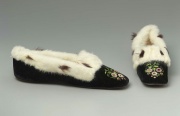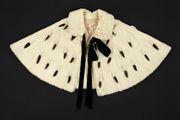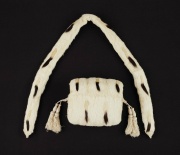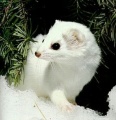Difference between revisions of "Ermine"
Jump to navigation
Jump to search
| Line 9: | Line 9: | ||
stoat (Mustela erminea); short-tailed weasel; lækat (Dan.); Hermelin (Deut., Sven.); armiño (Esp.); hermine (Fr.); hermelijn (Ned.); gronostaj(Pol.); arminho (Port.); | stoat (Mustela erminea); short-tailed weasel; lækat (Dan.); Hermelin (Deut., Sven.); armiño (Esp.); hermine (Fr.); hermelijn (Ned.); gronostaj(Pol.); arminho (Port.); | ||
| − | [[File:52.1314b-SC10197.jpg|thumb|Muff and stole<br>MFA# 52.1314] | + | [[File:52.1314b-SC10197.jpg|thumb|Muff and stole<br>MFA# 52.1314]] |
== Physical and Chemical Properties == | == Physical and Chemical Properties == | ||
Latest revision as of 11:53, 18 October 2020
Description
The fur trade name for the winter white coat of a stoat (Mustela erminea). Weasels have reddish brown fur in the summer and a thick, white coat in winter with the exception of the tip of the tail which remains black. Found primarily in Eurasia and North America, white ermine fur was highly valuable. During the 14th century in England, only nobility were allowed to wear ermine.
Synonyms and Related Terms
stoat (Mustela erminea); short-tailed weasel; lækat (Dan.); Hermelin (Deut., Sven.); armiño (Esp.); hermine (Fr.); hermelijn (Ned.); gronostaj(Pol.); arminho (Port.);
Physical and Chemical Properties
Color = white in winter Guard hairs = silky
Additional Images
Resources and Citations
- Encyclopedia Britannica, http://www.britannica.com Comment: "ermine" [Accessed November 15, 2001].
- Edward Reich, Carlton J. Siegler, Consumer Goods: How to Know and Use Them, American Book Company, New York City, 1937
- Wikipedia: http://en.wikipedia.org/wiki/Ermine (Accessed Nov. 2, 2005)





